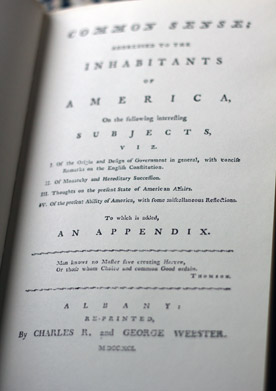Thomas Paine (February 9, 1737) – June 8, 1809) was an English-American political activist, author, political theorist and revolutionary. As the author of two highly influential pamphlets at the start of the American Revolution, he became one of the Founding Fathers of the United States. His ideas reflected Enlightenment era rhetoric of transnational human rights.
Common Sense is a pamphlet written by Thomas Paine. It was first published anonymously on January 10, 1776, at the beginning of the American Revolution. Common Sense, signed “Written by an Englishman”, became an immediate success. In relation to the population of the Colonies at that time, it had the largest sale and circulation of any book in American history. Common Sense presented the American colonists with an argument for freedom from British rule at a time when the question of independence was still undecided. Paine wrote and reasoned in a style that common people understood. Forgoing the philosophy and Latin references used by Enlightenment era writers, he structured Common Sense like a sermon, and relied on Biblical references to make his case to the people. He connected independence with common dissenting Protestant beliefs as a means to present a distinctly American political identity. Historian Gordon S. Wood described Common Sense as, “the most incendiary and popular pamphlet of the entire revolutionary era”.
One of the most influential works of political philosophy in history.
Contents:
Common Sense:
- Of the Origin and Design of Government in General, with Concise Remarks on the English Constitution
- Of Monarchy and Hereditary Succession
- Thoughts on the Present State of American Affairs
- Of the Present Ability of America: with some Miscellaneous Reflections
Rights of Man:
- Chapter 1: Of Society and Civilisation
- Chapter 2: Of the Origin of the Present Old Governments
- Chapter 3: Of the Old and New Systems of Government
- Chapter 4: Of Constitutions



